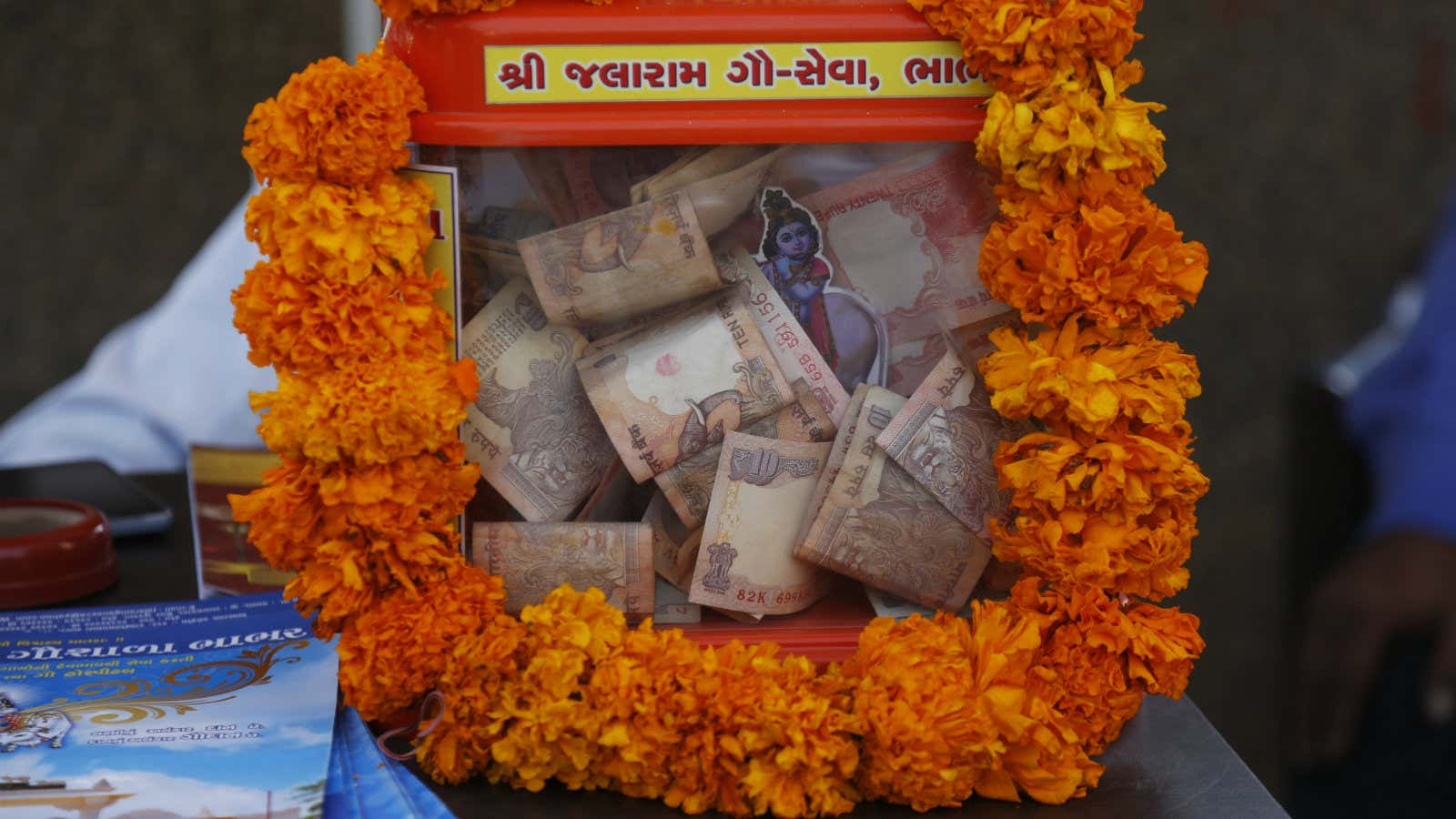In many cases, the deeper connections of the Sanskrit vocabulary used for the language of business reveal a strong undercurrent of morality encoded in the law.
A wide-ranging term that appears frequently, not only in sections on business law but throughout the Dharmashastras, is artha. The early Sanskrit texts speak of three legitimate spheres of human activity, also known as the goals of life (purushartha): dharma (righteousness), artha (material well-being) and kama (pleasure). Later texts added a fourth goal, moksha (liberation). Within this scheme, artha is one of four “human goods,” four things people should engage in and relish as people. Given the highly spiritualistic representations of India, it is important to highlight that wealth, prosperity, and material comforts were counted among the essential pursuits of humanity. Materialism as such is not the point. Rather, a good life is measured in part by one’s ability to achieve a comfortable life and the opportunity to enjoy it.
…
Wealth in the sense of artha is more than just legal property.
It is a way of viewing possessions as not inherently evil, but instead part of a full, useful life. Within the pursuit of artha, material well-being, the distinguishing feature of business in Dharmashastra is labha, or profit. Indeed, Vijnaneshvara defines it in just these terms, “Business is buying and selling for the sake of making a profit” (Laws of Yajnavalkya [1.119]). Over and over again, we have seen the profit motive acknowledged and even praised within the context of business, as in the guiding quote of this chapter from Narada (8.11). Profit is the desired and legitimate end of business. From the other side, Yajnavalkya (1.276) points to the failure of merchants to make a profit or farmers to reap a successful harvest as external signs that they are possessed by Ganapati, the lord of obstacles.
…
Alongside profits, businesses can make money through vriddhi (interest). The word literally means, “increase, prosperity, what has grown,” and thereby comes to mean interest in a technical sense. The Dharmashastras contain great ambivalence about making one’s entire living by lending on interest. As with many ancient legal systems, usury was a socially degraded practice and money-lending a socially suspicious profession, no matter how lucrative. This practice and profession are referred to as kusida or varddhushya in the texts, the latter of which implies an immoral, exploitative practice, and refers to excessive interest via predatory loans.
Vriddhi, by contrast, connotes growth and prosperous increase, even success. Reasonable interest rates and schemes are the proper reward for supplying credit or capital to someone. Everyone “wins” when interest is fair. Turning interest into a lifestyle or livelihood invites the temptation to use loans selfishly to aggrandize one’s wealth at the expense of others. Rather, proper interest should lead to financial gain together with gain for others too. Lending at interest thus requires the virtues of restraint and empathy in order to make the transaction mutually beneficial. Another frequent term with connotations of virtue in the business law sections of the Dharmashastra is bhriti (wages), the money paid to employees and servants for their work. Bhriti comes from a root that means “to bear, to support.” It thus means something closer to one’s “means of livelihood,” the material support that makes life possible.
…
Two terms for contract (samaya, samvid) highlight both the virtues of mutuality and agreement necessary for business deals to conclude fruitfully. The prefix sam, “together,” is used for many contractual words. Contracts are “moments” when parties “come together” to make a deal or “know together” the details of an agreement. The texts emphasize the need for contracts to be mutually beneficial; the texts hate technicalities of legal documents or witnesses that produce imbalance or unfairness in contracts.
Productive business for the Dharmashastras…arises from relationships that business people share, both through contracts and outside of them. The opposite of living up to one’s promises and contractual obligations is called anapakarma (failure to perform), a term used as part of several titles of business law. Failure to abide by contractual terms, failure to deliver goods on time and failure to pay wages are just the most prominent examples of a category that focuses on the duties people must observe when doing business. Anapakarma means shirking one’s responsibilities, whether from laziness, greed, or deceit. Whatever its cause, such failures are the basic reason we need laws for business in the first place.
…
Finally, the one terrible, unforgiveable root of immorality in Dharmashastra is lobha (greed). Though it is directed towards the king, Laws of Manu (7.49) points to the fundamental nature of greed as a source of immorality: “Wise men identify the root of both sets of vice arising from pleasure (kamaja) and wrath (krodhaja), and it is greed (lobha). He should diligently overcome it.” Eighteen other vices are traced back to greed, and it is regularly cited as the cause underlying failures of business, governance, law and religion. The texts portray kings, heirs, and bankers as particularly susceptible to greed, and many admonitions are directed at them. This distinctly unvirtuous trait, however, creeps into many other areas of life.
…
From both positive and negative angles, the vocabulary of business law in the Dharmashastras promotes the cultivation of many virtues and the destruction of many vices. For a tradition that we can only understand as legal, the importance of virtue raises the perennial question of how the Dharmashastras purport to inculcate morality within the law.
Donald R Davis is an associate professor of Sanskrit and Indian religions at the University of Texas, Austin. This is excerpted from his book The Dharma of Business with permission from Penguin India. We welcome your comments at [email protected].
